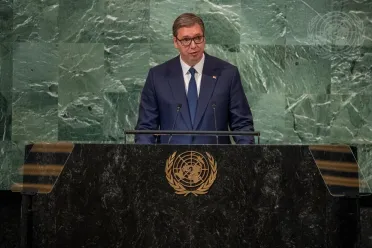Statement
Statement summary
ALEKSANDAR VUČIĆ, President of Serbia, said the General Debate is being held during a period of undermined world peace that has not been seen since the Second World War and the founding of the United Nations. The global challenges are threatening to radically change the international security architecture and jeopardize the established international legal order. “Such complex times demand a lot of wisdom and unity, in order to preserve peace as the absolutely most important heritage woven into the foundations of the United Nations Organization,” he said.
He said the current global developments show the principle of peaceful resolution of disputes has no alternative. This principle is best described in the Charter preamble. Serbia supports the territorial integrity of all Member States, including that of Ukraine. Many speakers, in discussing the stories about the aggression and violation of that country’s territorial integrity, say this is the first conflict on European soil after the Second World War. Yet the truth that the territorial integrity of Serbia, which did not attack any other sovereign country, was violated is constantly unspoken. “We ask for a clear answer to the question I’ve been asking my interlocutors, leaders of many countries for years — what is the difference between the sovereignty and territorial integrity of Ukraine and the sovereignty and territorial integrity of Serbia, which was grossly violated, and for which you provided international recognition and legitimacy?” he asked, adding that no one has ever provided a rational answer to that question.
Serbia has not stepped on someone else’s territory or endangered the territorial integrity of a single sovereign State, so that anyone might intervene or carry out aggression against it, the way it was done in 1999. Yet that did not prevent NATO from attacking a sovereign country without the Council’s decision. The signing of the agreement with NATO, whose provisions envisaged adoption of Security Council resolution 1244 (1999), and which confirmed and guaranteed partial sovereignty and full territorial integrity of Serbia, did not prevent many Western countries from unilateral recognition of the independence of the so-called “Kosovo” and from violating, once again, Serbia’s territorial integrity. Even though Serbia still experiences the consequences of the gross violation of basic provisions of international public law, the country has not given up on the United Nations founding principles. “We shall keep advocating for the consistent observance of the principle of inviolability of borders, respect for sovereignty and integrity of all other UN Member States,” he said.
He said he was especially grateful to all Member States, now comprising most of the Assembly, who support Serbia’s territorial integrity, particularly in the space and territory of Kosovo and Metohija. He said he is searching very patiently, and with much good will, for a compromise regarding Kosovo and Metohija, under the auspices of the European Union and within the Belgrade-Pristina dialogue. While it has been a difficult process for more than 10 years, he sees no alternative. “It is better to negotiate for a hundred years, than to wage war for a single day,” he said, adding the goal was a long-lasting peace to provide for a prosperous life for Serbs and Albanians in the region.
There are many unprecedented challenges facing countries this century, including energy security, the financial safety of developing countries and distortions in the food supply chains. Energy security is an inseparable part of national security and key for economic development and progress in Serbia, he said. He is working to provide for the country’s continuous energy supply. Another important challenge is finding efficient solutions to the food supply security situation. Serbia will continue to be a reliable partner in achieving the common goals defined within the United Nations framework.
Full statement
Read the full statement, in PDF format.
Photo

Previous sessions
Access the statements from previous sessions.
